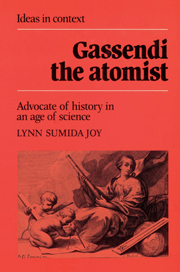Book contents
- Frontmatter
- Contents
- Preface
- List of illustrations
- INTRODUCTION
- PART 1 HUMANIST HISTORIOGRAPHY
- PART 2 PHYSICS AND THE HISTORY OF PHILOSOPHY
- 5 Unrecognized cultural baggage: the incoherence of contemporary debates about atoms
- 6 Uncertainties of observation and explanation: the role of optical anomalies in astronomy
- 7 Skepticism is based on bad history: Gassendi interprets Epicurus' arguments concerning the existence and qualities of atoms
- 8 Epicurus' conception of proof and Gassendi's historical justification of an atomist metaphysics and physics
- 9 Between culture and nature: was Gassendi a historian, a scientist, an empiricist?
- List of abbreviations used in the notes
- Notes
- Index of names
7 - Skepticism is based on bad history: Gassendi interprets Epicurus' arguments concerning the existence and qualities of atoms
Published online by Cambridge University Press: 01 September 2009
- Frontmatter
- Contents
- Preface
- List of illustrations
- INTRODUCTION
- PART 1 HUMANIST HISTORIOGRAPHY
- PART 2 PHYSICS AND THE HISTORY OF PHILOSOPHY
- 5 Unrecognized cultural baggage: the incoherence of contemporary debates about atoms
- 6 Uncertainties of observation and explanation: the role of optical anomalies in astronomy
- 7 Skepticism is based on bad history: Gassendi interprets Epicurus' arguments concerning the existence and qualities of atoms
- 8 Epicurus' conception of proof and Gassendi's historical justification of an atomist metaphysics and physics
- 9 Between culture and nature: was Gassendi a historian, a scientist, an empiricist?
- List of abbreviations used in the notes
- Notes
- Index of names
Summary
I have argued thus far that the scientific discussions in which Gassendi took part during the 1630s and 1640s exhibited two features which he would have considered noteworthy because of his dual interest in humanist historiography and natural philosophy. The first was the extent to which certain contemporary debates, such as those concerning atomism, were dominated by the indiscriminate borrowing of arguments from a wide array of ancient philosophical sources, often without adequate acknowledgment of these sources. This unacknowledged cultural baggage rendered discussions incoherent in the sense that advocates of differing positions did not always fully understand the significance which their arguments had had in the context of the ancient Greek philosophical controversies. Hence the borrowed arguments were frequently applied to inappropriate contemporary situations. This had clearly been the case in the debate over Poysson's problem concerning the nature of mathematical points. The second notable feature of Gassendi's scientific discussions was the high degree of tolerance shown by participants toward the exploration of incommensurable theories and metatheoretical issues, even in the interpretation of experiments involving well-defined phenomena. Gassendi's 1636 experiment to determine the sun's apparent diameter and his lengthy correspondence about the optical paradox generated in this experiment amply illustrated such tolerance.
The incoherence which resulted from misapplications of the ancient philosophical arguments and the additional conflicts even among contemporary theories underscored the need for pursuing historical research and interpretation within science itself.
- Type
- Chapter
- Information
- Gassendi the AtomistAdvocate of History in an Age of Science, pp. 130 - 164Publisher: Cambridge University PressPrint publication year: 1988

